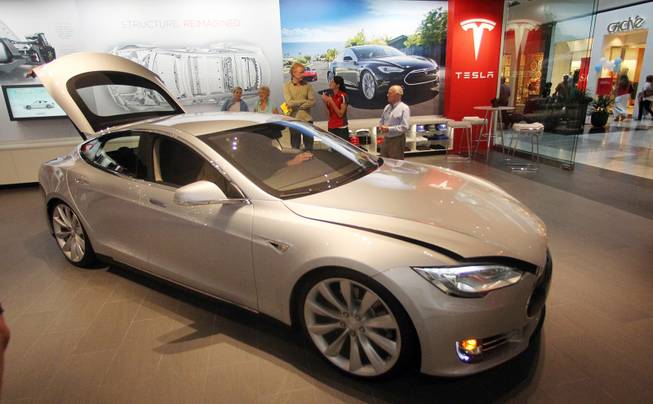
The Associated Press
A Tesla Model S is shown in the showroom at Washington Square Mall on July 20, 2012, in Portland, Ore. Tesla Motors produces electric cars that can go from 0 to 60 mph in less than 6 seconds, all without a drop of gasoline.
Published Tuesday, April 2, 2013 | 12:02 p.m.
Updated Tuesday, April 2, 2013 | 12:57 p.m.
A futuristic mural in the mayor’s office of old City Hall used to depict a "Jetsons"-esque city with flying cars zipping down Fremont Street.
Flying cars aren’t here yet, but you might see many fewer gas-powered cars on the streets in large part because Downtown Project confirmed today it ordered 100 all-electric Tesla-S cars last week.
The vehicles will be part of a multimodal project designed by the Downtown Project to get people to get rid of their cars.
Bicycles and lower-end electric vehicles also will be part of the system, which is being called Project 100. When the concept was unveiled a few months ago, Zach Ware, who is leading the effort for Downtown Project, said members would get a black card used to activate the bikes or cars.
The system wouldn’t be free. As the program is rolled out, patterns of use will become more evident, potentially altering the cost. Currently, Ware said, the cost is envisioned around $400 per month for membership – roughly the cost of owning a car and paying insurance.
A mobile phone application will be incorporated to give users information on the location of a bike or car, how long it might take to get somewhere or get picked up by a shuttle bus.
In an interview published online, Ware said the program would be structured around different zones: Downtown, which is about one mile around a central point; Residential, about two miles around the Downtown zone; and the City and Outer zones, defined by areas outside of the metro area.
“We can offer ... a set of options that will get you picked up, or in a vehicle or bike to drive, within a guaranteed amount of time that’s consistent,” Ware said. “For example, you will always know that if you are in the residential zone and want to get to the Downtown zone, you can be picked up at your door within 10 minutes.”
Ware added that unlike car-share programs in other cities around the United States, this one is designed “to replace your car 100 percent of the time.”
“You have one key to your car and we wanted to build something that replaced that one key with one membership and not force you to decide each time which system was best for your need right now,” he said.
Getting Project 100 to work properly isn’t as simple as buying electric cars and bikes and creating a smartphone application. Downtown Project is working with NV Energy on necessary recharging stations but has also employed Tucson-based Local Motion, a unique car company that Ware said was working on “building hardware that taps into a car’s onboard systems and reports location, unlocks doors, handles maintenance and more.”
“Along with that they’ve built a really cool fleet management system ... “ he added. “Not only are we managing real time vehicle availability based on complex legal and supply/demand logic, but we have to know when a car needs to be charged and where it needs to go to do that.
“We have to respond to a member who needs to be picked up on the edge of the city, we need to see when a station is out of bikes and have the prediction capability to plan the optimal busy routes for party buses.”
In a video interview online, Ware summed up the the technology behind the project as “gigantic.”
Joe Schoenmann doesn’t just cover downtown, he lives and works there. Schoenmann is Greenspun Media Group’s embedded downtown journalist, working from an office in the Emergency Arts building.

Join the Discussion:
Check this out for a full explanation of our conversion to the LiveFyre commenting system and instructions on how to sign up for an account.
Full comments policy